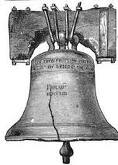
These two words are used interchangeably today. Are we correct to conclude that they mean the same thing? Looking at this from a Christian worldview we must first appeal to Scripture to see if they convey the same meaning.
We find the word freedom used only two times in Scripture. Once in the Old Testament (Lev 19: 20) and once in the New Testament (Acts 22: 28). Both occurrences are used in reference to people who are in bondage or enslaved. The word liberty appears 27 times in Scripture, most frequently in the New Testament.1
Generally speaking, liberty is used in the context which denotes “right,” “authority,” or even “privilege.” In certain contexts it connotes the freedom to exercise one’s right.
 While these terms are very close in meaning there is a distinct difference between them. Freedom means to be exempt from the control of another person or arbitrary restriction. On the other hand, liberty carries this same general meaning but it goes further by acknowledging one is under authority. Obviously as Christians we first come under the authority of Christ Jesus and then we are to submit to the righteous authority of family, church and government.
While these terms are very close in meaning there is a distinct difference between them. Freedom means to be exempt from the control of another person or arbitrary restriction. On the other hand, liberty carries this same general meaning but it goes further by acknowledging one is under authority. Obviously as Christians we first come under the authority of Christ Jesus and then we are to submit to the righteous authority of family, church and government.In the context of the founding and framing of America we can understand freedom as exemption from control by some other person or governing body that encroaches upon our inalienable, or God given, rights. These are defined in the First Amendment as religion, speech, press, assembly and petition.
Liberty is the sum of the rights possessed in common by the people of a community, state and country – generally in that order - as they apply to its government, and/or the expectation that a nation's people have exemption from control by a foreign power.
Freedoms are things that people extract from their government; Liberty is less derivative, more formative; a thing granted by the people to the people in common. Freedoms end when they encounter a contrary freedom of another person. Liberty lacks that distinction; liberty works within the confines of authority, liberty is an exorcise of privilege. Ultimately freedom deflects and avoids all authority contradictory to personal sentiment while liberty acknowledges and submits to righteous authority. Freedom often becomes self serving while liberty characterizes humility.
In part 2 we will explore how our founders and framers understood and applied these similar yet distinct principles.

comments
0 Responses to "Freedom vs. Liberty (Part 1)"Post a Comment